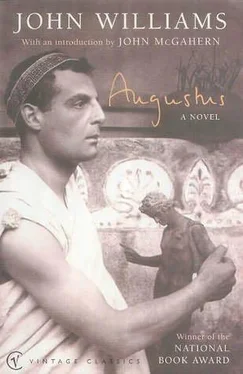John Williams - Augustus
Здесь есть возможность читать онлайн «John Williams - Augustus» весь текст электронной книги совершенно бесплатно (целиком полную версию без сокращений). В некоторых случаях можно слушать аудио, скачать через торрент в формате fb2 и присутствует краткое содержание. Жанр: Историческая проза, на английском языке. Описание произведения, (предисловие) а так же отзывы посетителей доступны на портале библиотеки ЛибКат.
- Название:Augustus
- Автор:
- Жанр:
- Год:неизвестен
- ISBN:нет данных
- Рейтинг книги:3 / 5. Голосов: 1
-
Избранное:Добавить в избранное
- Отзывы:
-
Ваша оценка:
- 60
- 1
- 2
- 3
- 4
- 5
Augustus: краткое содержание, описание и аннотация
Предлагаем к чтению аннотацию, описание, краткое содержание или предисловие (зависит от того, что написал сам автор книги «Augustus»). Если вы не нашли необходимую информацию о книге — напишите в комментариях, мы постараемся отыскать её.
Augustus — читать онлайн бесплатно полную книгу (весь текст) целиком
Ниже представлен текст книги, разбитый по страницам. Система сохранения места последней прочитанной страницы, позволяет с удобством читать онлайн бесплатно книгу «Augustus», без необходимости каждый раз заново искать на чём Вы остановились. Поставьте закладку, и сможете в любой момент перейти на страницу, на которой закончили чтение.
Интервал:
Закладка:
It is rumored that despite your letter of advice (a copy of which you were most kind to send to me, and which I acknowledge with much gratitude) he intends now to accept the terms of Caesar's will. I hope that this is not true, but I fear the rashness of youth. I entreat you to use what influence you have to dissuade him from this course, or, if the step has been taken, to persuade him to renounce it. To this end, I shall be glad to lend whatever assistance I can; I shall make preparations to leave my lodge here at Astura in the next few days, so that I may be with you at Puteoli when he arrives. I have been kind to him in the past, and I believe that he admires me.
I know that you bear some affection for the boy, but you must understand that he is, however remotely, a Caesar, and that the enemies of our cause may make use of him if he is allowed to go his own way. In rimes such as these, loyalty to our Party must take precedence over our natural inclinations; and none of us wants harm to come to the boy. You must speak to your wife about this (I remember that she has great power over her son) as persuasively as you can.
I have had news from Rome. The situation is not good, but neither is it hopeless. Our friends still do not dare show their faces there, and even my dear Brutus must do what he can in the countryside, rather than remain in Rome and repair the Republic. I had hoped that the assassination would at once restore our freedom, return us to the glory of our past, and rid us of the upstarts that now presume to disturb the order that we both love. But the Republic is not repaired; those who should act with fortitude seem incapable of resolution, and Antonius prowls like a beast from one spoil to another, pillaging the treasury and gathering power wherever he can. Had we to endure Antonius, I could almost regret the death of Caesar. But we will not have to endure him long-of that I am convinced. He moves so recklessly that he must destroy himself.
I am too much the idealist, I know-even my dearest friends do not deny that. Yet I most reasonably have faith in the eventual justice of our cause. The wound will heal, the thrashing will cease, the Senate will find that ancient purpose and dignity which Caesar almost extinguished-and you and I, my dear Marcius, will live to see that old virtue of which we have so often spoken once again settle like a wreath upon the brow of Rome.
The events of the past few weeks press upon me. These matters have taken so much of my time that my own affairs suffer. One of the managers of my property, Chrysippus, came to me yesterday and remonstrated seriously with me; two of my shops have fallen down and others are deteriorating so badly that not only the tenants, but even the mice have threatened to migrate! How fortunate I am to have followed Socrates-others would call this a calamity, but I do not even count it a nuisance. How insignificant are such things! In any event, as a result of a long discussion with Chrysippus, I have come up with a plan whereby I can sell a few buildings and repair others, so that I will make my loss a profit.
V. Letter: Marcus Tullius Cicero to Marcus Junius Brutus (44 B. c.)
I have seen Octavius. He is at his stepfather's villa at Puteoli, which is just next to mine; and since Marcius Philippus and I are friends, I have free access to see him when I wish. And I must tell you at once that he has, indeed, accepted the inheritance and the name of our dead enemy.
But before you despair, let me hasten to assure you that this acceptance is of less moment than either of us might have dreamed. The boy is nothing, and we need have no fear.
With him are three of his young friends: one Marcus Agrippa, a huge bumpkin who would appear more at ease tramping a furrow, either before or after the plough, than walking in a drawing room; one Gaius Cilnius Maecenas, a harsh -featured but oddly effeminate youth who flounces rather than walks, and who flutters his eyelashes in a most repulsive way; and one Salvidienus Rufus, a thin intense boy who laughs a bit too much, but who seems the most tolerable of the lot. So far as I can gather, they are nobodies, with neither families of any import nor fortunes of any account. (If it comes to that, of course, neither is young Octavius's pedigree immaculate; his grandfather, on his father's side, was a mere country moneylender, and beyond that only the gods know where he comes from.)
In any event, the four of them wander about the house as if they had nothing to do, talking to visitors and generally making nuisances of themselves. They seem to know nothing, for you can hardly get an intelligent response from any of them; they ask stupid questions, and then seem not to understand the answers, for they nod vacantly and look somewhere else.
But I do not let either my contempt or my elation become apparent. I put on a grave show with the boy. When he first came, I clucked with sympathy and uttered platitudes about the loss of close relatives. From his response, I became persuaded that his grief was personal rather than political. Then I equivocated a bit, and suggested that however unfortunate the assassination (you will forgive me that hypocrisy, dear Brutus), there were many who thought that the act sprang from unselfish and patriotic motives. At no time did I detect in him any sign that he was distressed by these advances. I believe that he is in some awe of me, and that he may be persuaded to come to our side, if I handle this with sufficient delicacy.
He is a boy, and a rather foolish boy at that; he has no idea of politics, nor is he likely to have. He is activated neither by honor nor ambition but by a rather gentle affection for the memory of one he would had been his father. And his friends look only for the advantage that they can have in his favor. Thus he does not, I believe, constitute a danger for us.
On the other hand, we may be able to put this circumstance to our benefit. For he does have claim to the name of Caesar, and (if he can collect it) the inheritance. There are certain to be some who will follow him merely because of the name he has assumed; others, the veterans and retainers, will follow him because of their memory of the man who gave him that name; and still others will follow out of confusion and whim. But the important thing to remember is that we shall have lost none of our own, for those who might follow him are those who otherwise would have followed Antonius! If we can persuade him to our cause, we shall have doubled our victory; for at the worst, we shall have weakened Antonius's side, and that alone would have been victory enough. We shall use the boy, and then we will cast him aside; and the tyrant's line shall have come to an end.
As you can easily understand, I cannot speak freely of these matters with Marcius Philippus; though he is our friend, he is in an awkward position. After all, he is married to the boy's mother; and no man is wholly free of the weakness that marital obligations occasionally raise. Besides, he is not of sufficient importance to entrust with everything.
You may keep this letter for less perilous times, but please do not send a copy to our friend Atticus. Out of admiration for me and out of pride in our friendship, he shows my letters to everyone, even if he does not publish them. And the information here should not be known at large, until the future has proved my observations to be true.
A postscript: Caesar's Egyptian whore, Cleopatra, has fled Rome, whether in fear of her life or in despair at the outcome of her ambitions, I do not know; we are well rid of her. Octavius goes to Rome to claim his inheritance, and he goes in utter safety. I could hardly hide my anger and sorrow when I heard this from him; for this stripling and his loutish friends can go there without risk to their persons, while you, my hero of the Ides of March, and our Cassius, must lurk like hunted animals beyond the precincts of the city you freed.
Читать дальшеИнтервал:
Закладка:
Похожие книги на «Augustus»
Представляем Вашему вниманию похожие книги на «Augustus» списком для выбора. Мы отобрали схожую по названию и смыслу литературу в надежде предоставить читателям больше вариантов отыскать новые, интересные, ещё непрочитанные произведения.
Обсуждение, отзывы о книге «Augustus» и просто собственные мнения читателей. Оставьте ваши комментарии, напишите, что Вы думаете о произведении, его смысле или главных героях. Укажите что конкретно понравилось, а что нет, и почему Вы так считаете.











